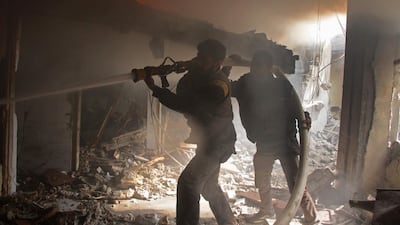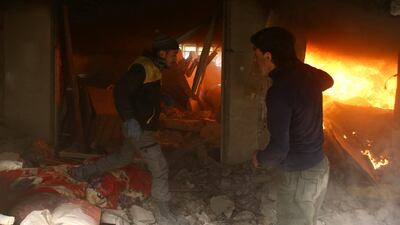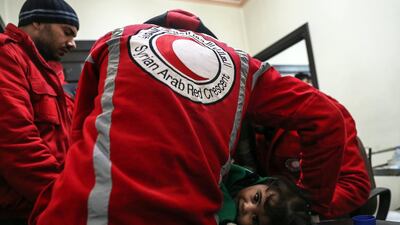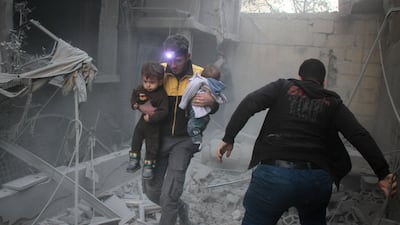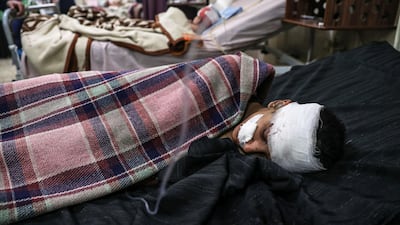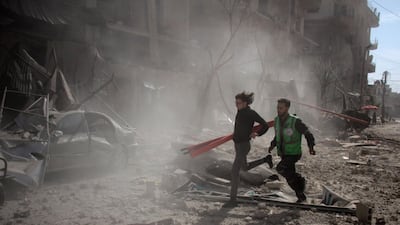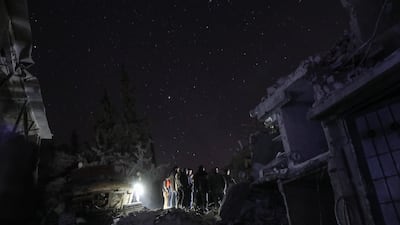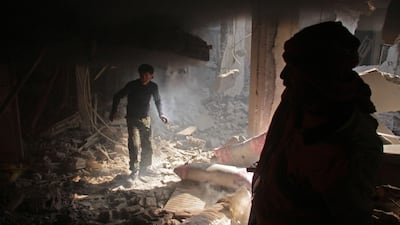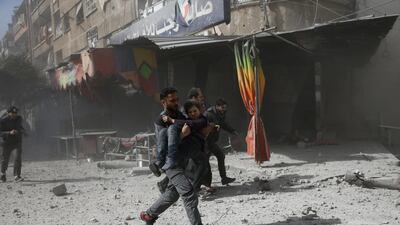The Syrian government came under mounting pressure Wednesday after a rising death toll swung global attention to the regime's deepening effort to reclaim rebel-held territory.
Three days of air attacks in eastern Ghouta, a suburb outside Damascus, and the northern city of Idlib, have killed more than 100 civilians. The bombardments are also being investigated by the United Nations and chemical weapons experts over alleged use of chlorine gas.
The latest strikes on Wednesday killed 23 people including five children in eastern Ghouta. Surrounding villages have been battered by air raids that left hospitals filled with wounded children.
Medics in Idlib were also treating casualties from Tuesday - the bloodiest day in the conflict for several months, when 78 people were killed.
The UN reported that at least three hospitals were hit in recent strikes and shelling.
French Foreign Minister Jean-Yves Le Drian said Wednesday it looked like Syrian President Bashar Al Assad's forces were using chemical weapons against rebels.
"I'm speaking with a degree of caution because you have to be careful pending full documentation, but all the indications that we have show that at the moment chlorine is being used by the Syrian regime," he said, referring to Al Assad's Russian-backed offensive.
Mr Le Drian said international law was "being violated by the Damascus regime, by Iran and those who are attacking eastern Ghouta and Idlib", calling on all Iranian-backed militia, including Lebanon's Hezbollah, to leave Syria.
France has long called for Al Assad's ouster, backing the Syrian opposition during the seven-year war. Mr Le Drian's also criticised Turkey for waging a separate offensive against Kurdish fighters in Afrin in north Syria.
______________
Read more:
Rebels make thousands smuggling ISIL fighters across Syria
France says 'all indications' point to Syrian regime using chlorine weapons
_______________
Rami Abdel Rahman, head of the Syrian Observatory for Human Rights, a British-based monitor of the conflict, said more than 80 civilians had died in eastern Ghouta.
"This was the highest civilian toll in Syria in nearly nine months," he said, referring to the most recent deaths.
The Organisation for the Prohibition of Chemical Weapons (OPCW) said on Wednesday it is probing "all credible allegations" relating to Syria.
The watchdog has been tasked with establishing "the facts surrounding allegations of the use of toxic chemicals", noting "grave concern" over at least two reports of chlorine being used by the regime this week.
UN war crimes investigators said on Tuesday that they were studying multiple reports that chemical weapons have been used in rebel-held zones.
That led the UN to call for a one-month ceasefire to ease what it described as an "extreme situation" that "we haven't seen before" at any point during the war.
At least 300,000 people have been displaced in Idlib since mid-December, when the most recent regime push on the area began.
The US said there was "obvious evidence" of recent chlorine gas attacks, including in eastern Ghouta. The United States has spoken of six suspected cases of chemical attack over the past month.
So far, more than 340,000 people have been killed in the Syrian conflict, which began in 2011 with anti-government protests that then morphed into a brutal civil war.
The government has denied using chemical weapons and condemned "lies and allegations" levelled by the West.
Russia has also fought back against what it calls a "propaganda campaign" over the accusations, arguing during a meeting of the UN Security Council on Monday that "no perpetrators have been identified".
France last month blacklisted companies and nationals it said had links to Syria's chemical weapons programme.
Meanwhile, the Syrian regime intercepted an Israeli attack on a military position in Jamraya, northwest of Damascus on Wednesday.
Jamraya is home to several military positions and a branch of the Syrian Scientific Studies and Research Center (SSRC), suspected of playing a leading role in chemical weapons production.
Syrian state news agency SANA, citing an army statement said its air defence units "destroyed most of" the Israeli missiles.
Meanwhile, Turkish operations against Syrian Kurdish forces and US and Russian-backed operations against ISIL continue to compound human suffering in the country's north and east.
The Turkish offensive in Afrin has strained ties with the United States, a Nato ally.
Ibrahim Kalin, a spokesman for Turkish President Recep Tayyip Erdogan said Wednesday that the US must end policies that "poison" relations, including support for Syrian Kurdish militia.
The comments come ahead of a planned visit by US Secretary of State Rex Tillerson and National Security Adviser H.R. McMaster to Turkey next week.
